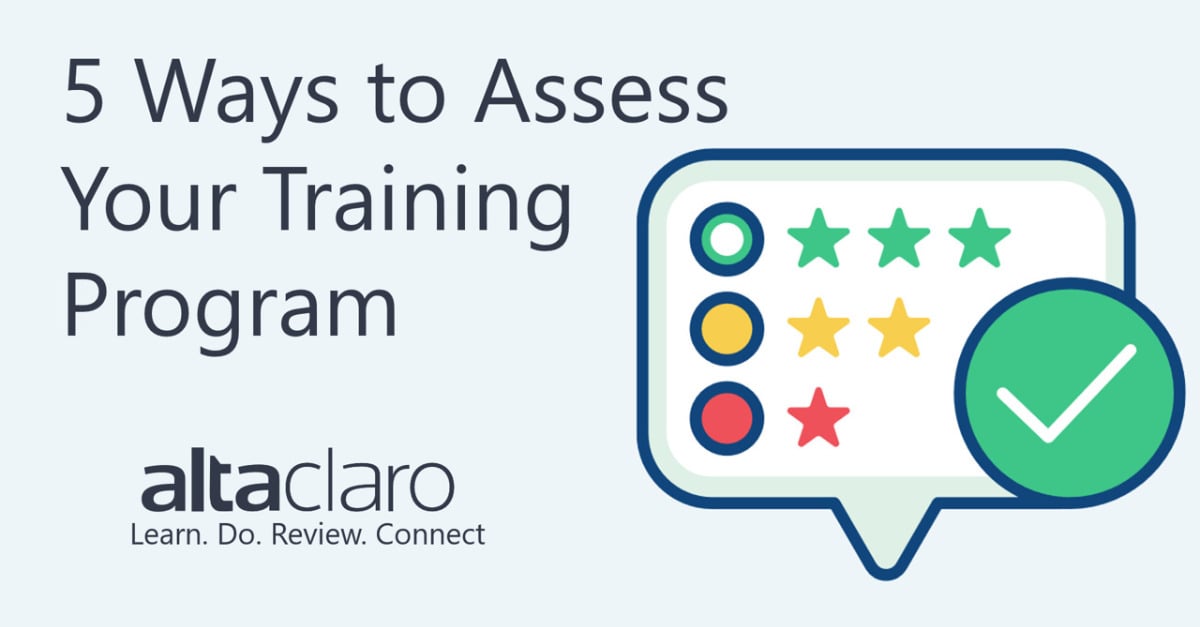
Now, more than ever, law firms are challenged by remote work and the difficulties of acquiring new clients and recruiting the best talent. Which is why training your associates quickly and effectively is more critical than ever. But is your current training program stuck in the past with an outdated approach, leaving your new associates without the proper knowledge and tools to succeed at their jobs? In this blog, we'll share the top five ways you can evaluate your current training program for transactional associates, so you can ensure your new employees always hit the ground running.
1. Transactional associate satisfaction.
Surveying your transactional associates is one of the most fruitful ways to evaluate your training program by determining your learners’ opinions on the educational material, program delivery, feedback, and more. Creating an effective survey, however, can be tricky. First, you need to establish the goals of your evaluation. What do you want to evaluate for, and why? Naturally, the goals of your evaluation should tie to your training objectives. For example, you may want to determine your Net Promoter Score (NPS), or ask how likely the training would help an associate with limited skills/knowledge in the subject area. Similarly, if the focus of your training program was increased engagement, you may want to evaluate how organized your instructors were.
Your survey should also have clearly worded questions that are free from bias and aren’t actually seven questions in one. Improving the user-friendliness of your survey will also help improve the quality of survey responses. You can achieve this by finding the best number of questions to maintain a high completion rate, organizing the questions in a logical order, and even running a pilot test with a small sample group to further optimize.
2. Training Completion
This method of evaluation assumes that your training programs task-oriented with elements of self-learning and deadlines. If your current training proem doesn’t currently allow you to evaluate completion along the way, you need to start. Ideally, your training program should be broken into different topics with the appropriate learning materials and various forms of assessments. By tracking whether your associates are reading their materials on time, completing assessments on time and/or within the allocated time, you can gauge various aspects such as learner engagement, material relevancy, program structure, and more. Missed assessments itself did not accurately reflect what was taught.
3. Learning Application
A training program is useless if your associates don’t know how to apply what they’ve learned to real assignments. The best training programs, however, simulate real work experience and allow associates to apply their new knowledge in a more safe, controlled environment. You can achieve this by using mock transactions from actual deals to gauge how well your associates are applying legal principals and concepts to real-world scenarios. Furthermore, you can incorporate questions focused on specific learning applications into your follow-up surveys. For Example, try conducting a survey immediately after your associates complete a specific training module or lesson (e.g., “Drafting & Negotiating Non-Disclosure Agreements”), then reassess the usefulness of the training module after they complete a real assignment on the same subject. You can also survey your associates’ supervisors to gain another perspective on the effectiveness of the training.
4. Learning Retention
It goes without saying that if your associates can’t remember and continue to apply what they’ve learned from their training, your program probably needs a few changes. You can evaluate your employee’s learning retention by regularly assessing them in the key takeaways or learning concepts from their training. These assessments can take the form of short multiple choice quizzes, and ideally should be bite-sized so they have minimal disruption to your associates’ workflows. If you discover that your training retention is low, even on topics where the assessments were completed with good scores, the issue may lie with the relevance of your content or the structure of your training.
5. Job Performance
Hopefully, you developed key metrics to evaluate before you deployed the training to your associates. Common metrics can include hours billed, client satisfaction quality of work, associate retention, percentage of promotions, and NPS. The most crucial aspect of measuring job performance is that the metrics you decide on can be consistently measured, over and over again. By using data-driven analytics, you can tangibly link your training program to your business results. Once you have a clear insight into the overall and individual performance of associates, you can determine what aspects of your training program need improvement.
How can we help with your training program?
Firms such as K&L Gates, Orrick, Herrington & Sutcliffe, Barnes & Thornburg, and Haynes & Boone turn to AltaClaro for the most effective training programs on the market.
Our online boot camps help lawyers leverage technology and learn practical legal skills in a hybrid format through mock transactions and live feedback sessions with seasoned practitioners. From Fundamentals of M&A Transactions, Corporate Transactions and Commercial Lending Transactions to Capital Markets, Real Estate Transactions, Technology Transactions and E-Discovery, our course catalog spans beginner to intermediate level classes. Our state-of-the-art learning technology platform also helps you measure and track training engagement and performance so you can see exactly how your training is driving better results for your employees as well as your ROI.
Schedule a free 30-minute consultation with one of our experts and learn how you can optimize the return on your training initiatives.

